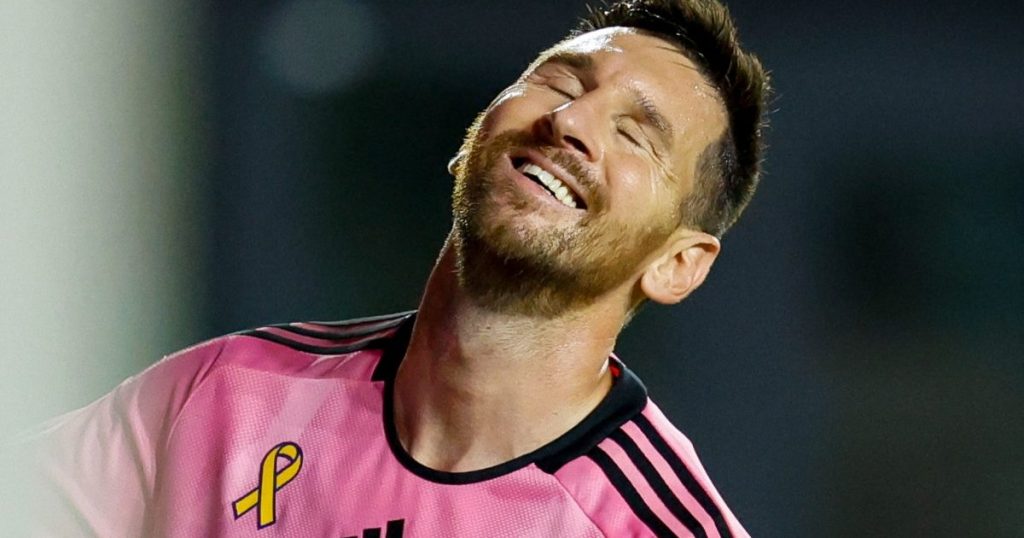Lionel Messi and Jordi Alba, teammates at Inter Miami CF, found themselves at the center of a controversy surrounding their absence from Major League Soccer’s All-Star Game, resulting in a one-game suspension imposed by the league. The decision, announced on Friday, stemmed from the players’ failure to participate in the mid-week All-Star festivities, a violation of MLS regulations requiring player participation unless a valid excuse, such as injury, is provided. The league’s firm stance underscored the importance it places on the All-Star Game, a showcase event designed to promote the league and its star players. While the reasons for Messi and Alba’s withdrawal were not initially disclosed, the decision had immediate repercussions, barring them from playing in Inter Miami’s upcoming match against FC Cincinnati. This unexpected development ignited debate and sparked concerns about the potential impact on the league’s image, especially considering Messi’s global stature and his recent arrival in MLS.
The league’s decision to suspend Messi and Alba triggered strong reactions, particularly from Inter Miami’s co-owner, Jorge Mas. Mas expressed his displeasure with the ruling, revealing that Messi was “very upset” by the league’s stance. He voiced concerns about the potential long-term consequences of the suspension, highlighting the possibility of it negatively impacting Messi’s perception of the league and its rules. Mas emphasized Messi’s unique status and his desire to compete in meaningful matches, suggesting that the All-Star Game, while a prestigious event, might not hold the same significance for a player of Messi’s caliber. Mas’s comments brought to light the delicate balance between upholding league rules and accommodating the needs and desires of star players, especially in the context of a rapidly growing league like MLS, which is eager to attract and retain global talent.
MLS Commissioner Don Garber acknowledged the difficulty of the decision, emphasizing the league’s respect for Messi and his contributions to MLS. While acknowledging Messi’s commitment to Inter Miami and understanding his decision to withdraw from the All-Star Game, Garber stressed the necessity of enforcing established league policy. He portrayed the decision as a matter of upholding the integrity of the league’s rules and ensuring fairness across all teams and players. However, Garber also indicated a willingness to review the existing policy in the future, suggesting an openness to adapting the rules to better suit the evolving landscape of the league and the unique circumstances of players like Messi. This signaled a potential shift in the league’s approach, acknowledging the need for flexibility in navigating the complexities of managing star players and maintaining a competitive balance.
The controversy surrounding Messi and Alba’s absence from the All-Star Game raised questions about the demands placed on players, particularly those involved in multiple competitions. Messi’s demanding schedule in recent weeks, including nine games in 35 days and participation in the FIFA Club World Cup, highlighted the physical toll on players. Inter Miami’s congested fixture list, with limited breaks compared to other MLS teams, further complicated the situation. Garber acknowledged the uneven scheduling and the challenges it posed for Miami, suggesting the need for the league to address these issues and find ways to better manage player workloads. This underscored the ongoing dialogue within MLS about balancing competitive demands with player welfare, a conversation intensified by the arrival of high-profile players like Messi who bring with them demanding international schedules.
Inter Miami coach Javier Mascherano had previously expressed his preference for Messi and Alba to be excused from All-Star duties, citing the need for rest and recovery. His comments foreshadowed the potential conflict between club and league priorities, highlighting the difficulties of managing player workloads in a congested season. Mascherano’s statement, while acknowledging the importance of the All-Star Game, emphasized the importance of prioritizing player well-being, especially given the demanding schedule faced by his team. This perspective underscores the complex interplay between club and league interests and the need for collaborative solutions to address player fatigue and ensure a sustainable competitive environment.
The Messi and Alba suspension episode brought to the forefront several key issues facing MLS. It highlighted the challenges of managing star players and balancing league rules with individual circumstances. The controversy also underscored the need for ongoing dialogue and potential policy revisions to adapt to the evolving dynamics of the league. The league’s willingness to review its All-Star Game participation policy signals a recognition of the need for greater flexibility and a more nuanced approach to managing player participation in such events. Furthermore, the incident emphasized the importance of addressing player workload and scheduling concerns to ensure player well-being and maintain a competitive balance within the league. The Messi and Alba case served as a valuable learning experience for MLS, prompting reflection on its rules and procedures and paving the way for potential adjustments in the future.


